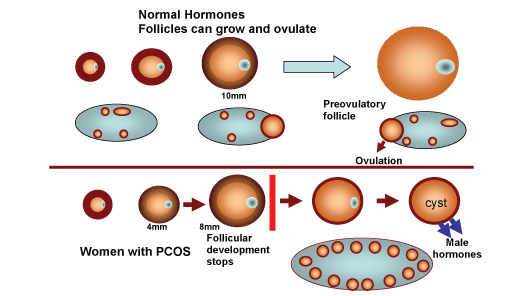PCOS is the most common hormonal disorder in women of reproductive age, affecting about 10% of women in this age group.
It is not known why some women develop the syndrome although it is likely to be a genetic disorder. The word ‘polycystic' means many cysts and women with this condition have several cysts in their ovaries. Women with this condition have an imbalance of the female hormones that prevents their ovaries form releasing an egg every month and the many unreleased eggs in the ovaries result in the characteristic polycystic appearance of the ovaries.
Since both fertility and a normal menstrual cycle rely on a regular release of an egg each month from the ovary, these women have difficulty in conception and low, irregular or absent periods.
Many women with PCOS also tend to produce too much male hormone (which normally all women produce in small quantities) which results in male pattern hair growth, for example on the chin, chest inner thighs etc., and the formation of acne.
These women tend to gain weight quite rapidly and the obesity makes the hormonal imbalance worse hence resulting in a ‘chicken and egg' situation.
How do the cysts in PCOS form?
 Complications of PCOS
Complications of PCOSInsulin Resistance Syndrome
Women with PCOS are unusually resistant to Insulin, a hormone essential in metabolising the carbohydrates and maintaining blood sugar levels. Because of this they are at an increased risk of developing type 2 diabetes, heart attack and stroke at a much younger age than other women.
Diabetes
More than 50% of women with PCOS will have diabetes or pre-diabetes before the age of 40.
Heart Disease
Women with PCOS have heart disease at an early age; in some studies 40% have calcification in their coronary arteries before age 45 (compared to 20% of women without PCOS). They have also been found to have a 50% increase in coronary events (heart attacks) compared to controls.
High Blood Pressure
Women with PCOS are at a greater risk of high blood pressure particularly after the age of 40.
Cholesterol
LDL (bad) cholesterol levels are higher and HDL (good) cholesterol levels are lower in women with PCOS compared with others.
Cancer
Women with PCOS are at a higher risk of endometrial (uterine) cancer if left untreated.